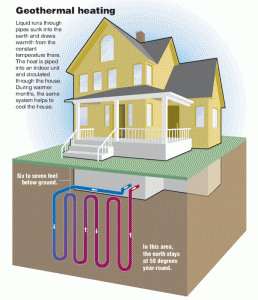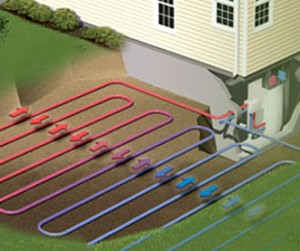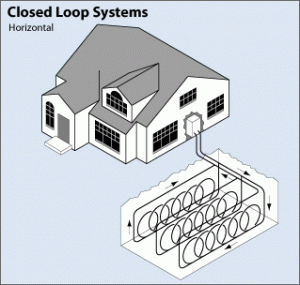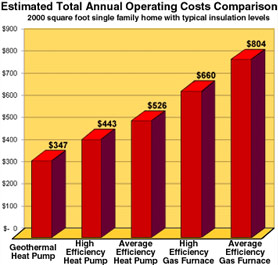
Geothermal Heating Diagram
Life in Georgia is hard if you are concerned about the environment. With a capital city the metropolitan area of which comprises a staggering 8,000 or so square miles, it should be no surprise that several Georgia citizens spend over an hour in their cars every day as they drive to and from work.
Fuel consumption may be lessened through teleworking, carpooling, and taking public transportation, but these options are not always very convenient. So while we wait for hybrids and other alternative-fuel cars to improve, consider using a Georgia geothermal energy solution to power your home.
Although there are numerous geothermal energy solutions in Georgia, Georgia Air Contractors (GAC)—one of Atlanta’s premier geothermal, heating, and air conditioning service providers—has been controlling indoor climates and keeping Georgia residents comfortable for over 25 years.
You may be wondering what is geothermal energy and how does it work. To state it in technical terms:
Geothermal power comes from heat stored naturally beneath the earth’s surface. This heat comes from the planet’s initial formation, from the radioactive decay of minerals in the earth’s layer, and solar energy passed through the earth’s surface.
That sounds pretty tricky, huh? Don’t fret. Stated a bit more simply, geothermal energy originates from heat stored below the earth’s surface, and it has been around since ancient times. Historic cultures in places such as France, China, and Rome used hot springs (a form of geothermal energy) for their public bathhouses. It has since been used in several ways, and after seeing its first industrial applications in the late 19th century, it has been successfully used to heat and cool homes and other buildings for the last fifty years.
Sadly, geothermal energy still comprises only a small part of our overall energy production, but that number continues to rise with year over year as more countries adopt some form of geothermal technology. This is encouraging to those concerned about the environment; geothermal energy’s benefits far outweigh its risks.
There are several positive aspects to using geothermal energy instead of energy generated through traditional fossil fuels. First, because geothermal energy is derived from heat already stored in the earth and the sun, it is constantly being renewed—thus making it one of the few reliable and sustainable energy options available for commercial business and private home use.
Next, geothermal energy is much cheaper than other forms of energy, and although the initial investment may be more than a standard furnace or air-conditioning unit, the unit will eventually pay for itself. The technology continues to improve, meaning that new and cheaper ways to install geothermal units are being discovered all the time.
Finally, geothermal energy is much cleaner than traditional fossil fuel. Per Geoexchange.org, “over a…20-year lifespan, 100,000 units of nominally sized residential GeoExchange systems will reduce greenhouse gas emissions by almost 1.1 million metric tons of carbon equivalents. That would be the equivalent of converting about 58,700 cars to zero-emission vehicles, or planting more than 120,000 acres of trees.” If you can afford it, switching over to geothermal energy seems like the obvious choice.
Geothermal energy comes from heat trapped in the earth, making it a green energy solution that is also renewable and sustainable. Since it’s cleaner than standard climate-controlling units, it’s especially worthwhile for Georgia residents to think about adding a geothermal energy solution in their homes. If we can’t cut down on our automobile gas consumption, shouldn’t we Georgians try to cut down on our fuel consumption wherever else we can?
Questions about geothermal energy? We can help. Please Contact Georgia Geothermal today.






